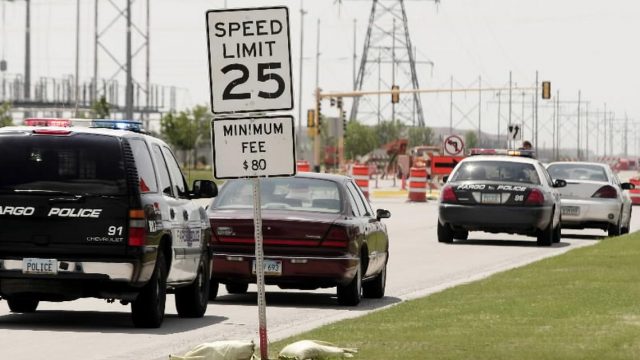Thanks to a Legislative Oversight, Can North Dakota Cities Even Make You Pay Higher Traffic Fines?

Serious constitutional questions may not be the only headache North Dakota cities face as they, enabled by state legislation passed in Bismarck earlier this year, raise traffic fines above state levels.
The City of Fargo, for instance, is one of a few communities in our state which has chosen to take advantage of the change in state law. They’ve doubled the fine for certain traffic violations, but that doubling only applies to Fargo police. If, say, a Cass County deputy stops you, or a North Dakota Highway Patrol officer, you’ll still pay the lower state fine.
This creates a situation where the exact same traffic violation, occurring under the exact same conditions in precisely the same geographic location, would have widely different fines associated with it depending on the uniform of the law enforcement officer stopping you.
The North Dakota Supreme Court, in a cased called Frey vs. North Dakota, found: “[w]hen two statutes prohibit the same conduct but result in different penalties a person suffering the more serious penalty has been denied equal protection of the laws.”
That’s just one problem with what the state legislature has allowed local governments to do. SB2304, introduced by Senator Erin Oban (D-Bismarck), amended the law to enable the locals to charge up to 100 percent more than the state-level fine.
What the bill didn’t do was amend section 39-06.1-02(4) of the North Dakota Century Code which reads like this:
What is section 39-06.1-06?
It’s the part of the Century Code that sets the state’s levels for traffic violations. You can read it here.
Why is this a problem for cities trying to double traffic fines?
If you’ve ever gotten a traffic ticket, you understand that if you don’t want to challenge the charge in a hearing, you pay a bond that is the same amount as the fine. You then forfeit that bond because you didn’t show up for the hearing, and it is applied to the fine, and everybody moves on with their lives.
While Senator Oban’s legislation changed the law to allow cities to as much as double the fines for traffic violations, the bill didn’t amend the part of the law which requires the bond to be equivalent to the state’s (not the local’s) fine.
Does that mean you could get away with paying only the state-level bond for a traffic violation in Fargo or one of the other cities which have raised their fines?
“Yes, based on a plain reading of the statute,” Fargo-based defense attorney Mark Friese told me when I posed that question to him.
The communities who have raised their fines may not feel the same way, and they may choose to litigate the matter if a ticketed motorist tries this, so if you find yourself in this situation, please seek your own legal guidance.
What is clear, for the purposes of this post, is the Legislature has made a mess out of this issue.
It’s not at all clear that local communities can actually get away with doubling their fines, given this loophole lawmakers left open. And even if communities get around that glaring problem, there’s the state supreme court precedent mentioned above, which holds that different punishments for the same crime are a violation of our equal protection rights.




